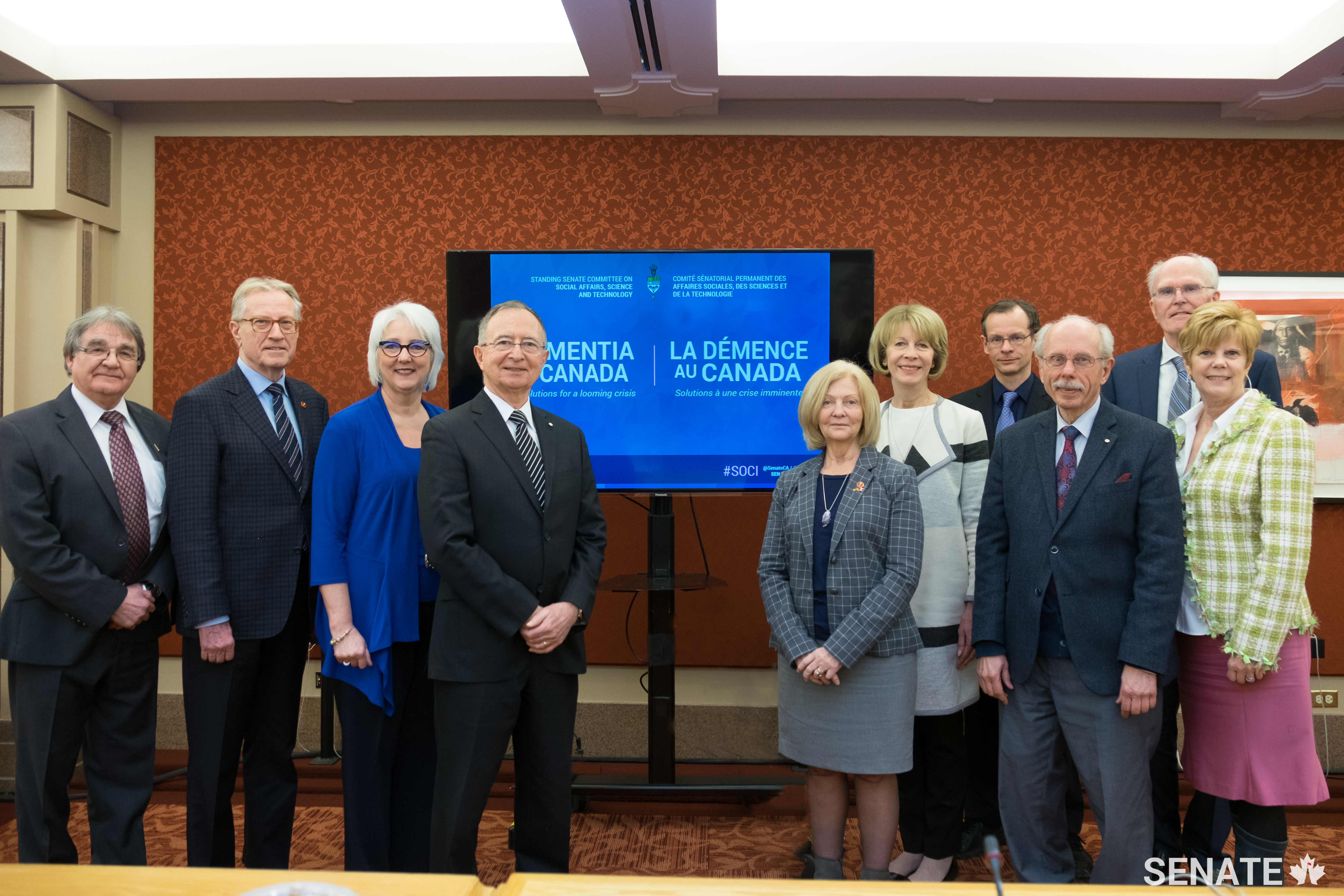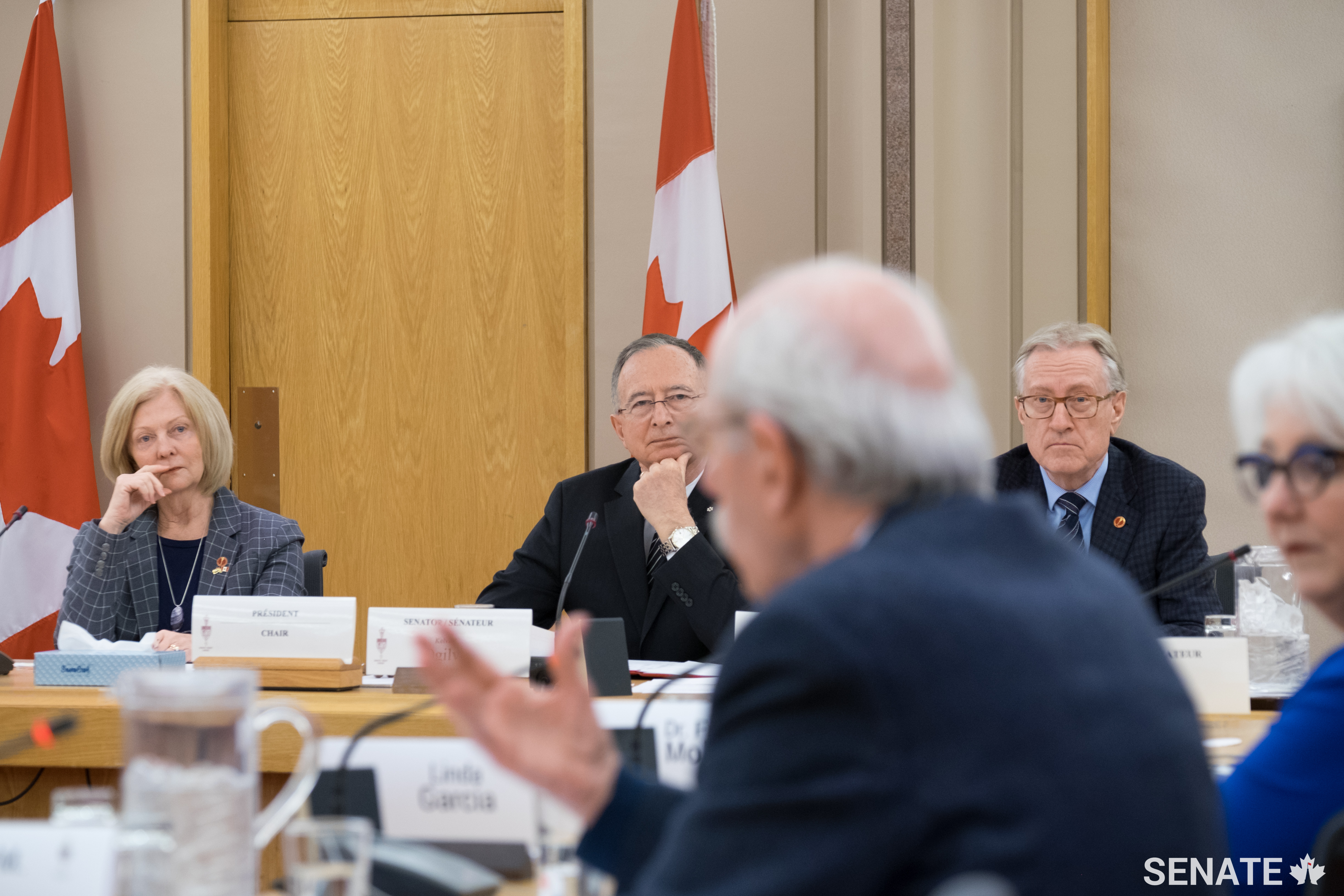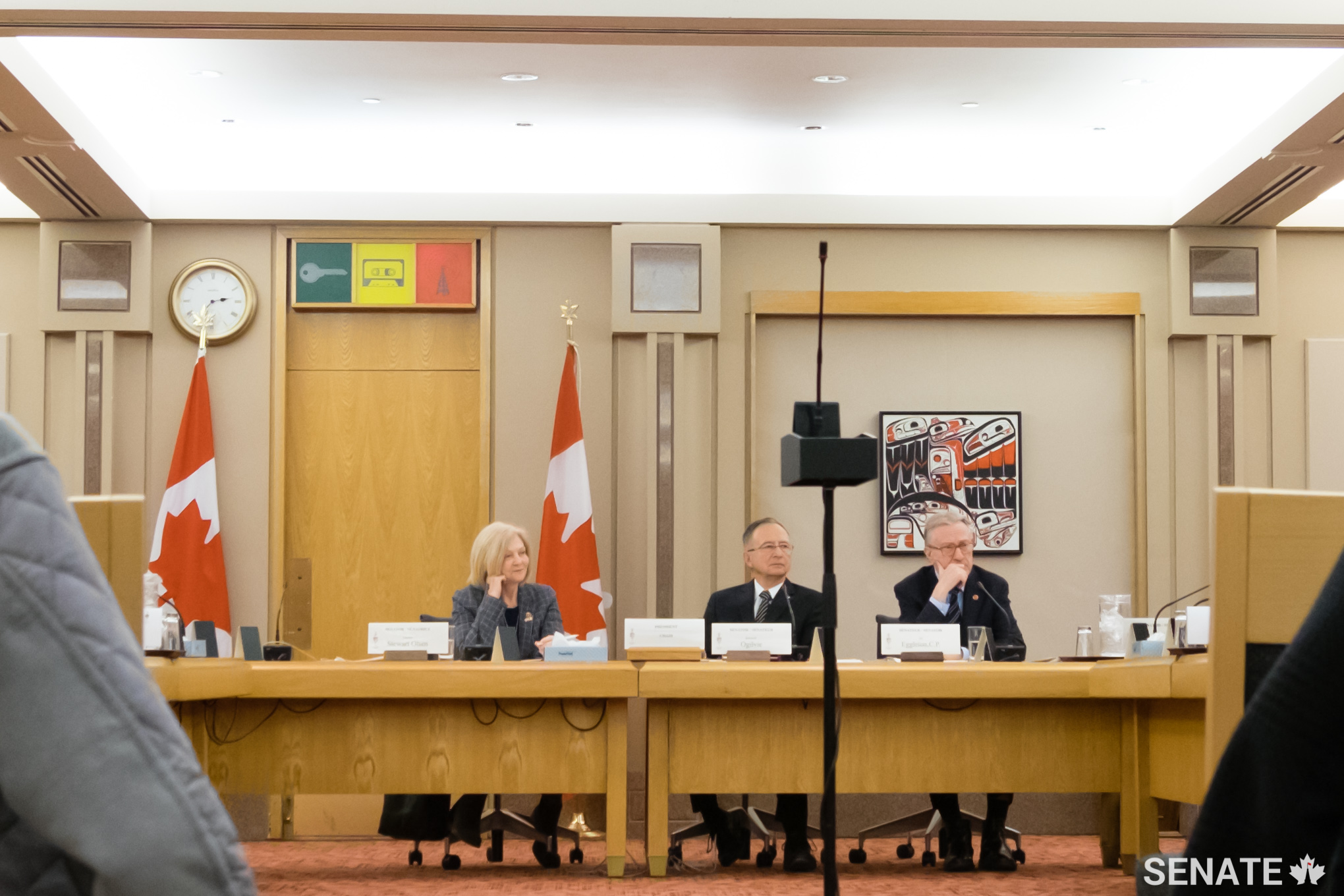Caregivers need respite from helping loved ones with dementia, panelists say

While Huguette Grand spent her 79th birthday in an Ottawa long-term care facility, her daughter Catherine poured her heart out to a panel of senators about what it has been like to be her mother’s caregiver for 11 years since she was diagnosed with dementia.
“I’m too young to have a 79-year-old daughter,” Catherine Grand said during a panel discussion on Parliament Hill organized by the Senate Committee on Social Affairs, Science and Technology.
“How do I become a daughter again? I’d really like to be a daughter again,” said Grand, a federal public servant from Ottawa, explaining how she has cared for her mother while struggling to find the kind of specialized care people living with dementia need.
“My mom needs a dentist really badly right now. She needs some kind of dentist with dementia knowledge and an eye doctor with dementia knowledge. And paramedics need to know how to handle dementia patients. Everybody needs to know.”
Grand’s experience has turned her into an advocate for better support for people with dementia and their caregivers. Her story is all too familiar, said health policy experts who took part in the Senate committee’s panel discussion, “Dementia in Canada: Solutions for a looming crisis,” on Monday, January 30, 2017.
The committee hosted the panel to follow up on a report it tabled in November in the Senate, Dementia in Canada: A National Strategy for Dementia-Friendly Communities and to expand the public discussion Senator Ogilvie said needs to take place in Canada.
“We felt it important to continue to engage with Canadians and raise awareness about the impact of dementia on Canadian society,” said Senator Kelvin Kenneth Ogilvie, chair of the Senate Committee on Social Affairs, Science and Technology, adding the panel discussion was timed to coincide with the end of Alzheimer Awareness Month.
The creation of a National Dementia Strategy was one of the committee’s 29 recommendations that aimed at ensuring adequate supports are put in place to care for the growing number of Canadians who will be living with dementia.
The committee believes one of the first steps should be the creation of a Canadian Partnership to Address Dementia, a new organization with a mandate to create and implement that National Dementia Strategy. That recommendation received widespread support from participants at the panel discussion as well as from advocates for dementia care, generally.
Senator Art Eggleton, the committee’s deputy chair, said some of its recommendations were intended “to ease the burden on people who find themselves thrust into a role they weren’t expecting, might not be prepared for but who wouldn’t, couldn’t dare to think about hiding from that role.”
Panelists came with their own ideas, including having the children of people with dementia act as caregivers, enlisting the help of youth and other volunteers, avoiding caregiver burnout and allowing extended family members to make tax-deductible contributions to in-home care and to residential care (costs of retirement homes) for their loved ones. This could delay or prevent the need for long-term care (Nursing Homes) and relieve the growing pressure to provide long-term care.
Providing relief for caregivers should be included in any strategy for managing dementia, said Professor Linda Garcia, a member of the University of Ottawa's Faculty of Health Sciences.
Respite should be for the caregiver, she said, adding the medical community doesn’t have much information about what caregivers for people living with dementia do when they get “their time off.”
“We need to change the doom and gloom who think that long term care is like sending my loved one to a jail. We’re making people feel guilty," she said.
Providing care for a loved one with dementia puts an unexpected weight on the caregiver’s shoulders.
“If you take that weight off, it doesn’t mean it hasn’t left a mark,” Professor Garcia said.
Similarly, Alzheimer Society of Canada chief operating officer Debbie Benczkowski suggested better training and financial support would help families when they have to deal with a sudden diagnosis of dementia.
“Caregiving puts tremendous pressures on families - financial pressures as well as just physical pressure,” Benczkowski said.
How to avoid burnout among caregivers is one of the pieces of information that should be more widely and more easily available, said Dr. Frank Molnar, vice-president of the Canadian Geriatrics Society.
Dementia needs a public awareness campaign similar to what Bell's Let’s Talk day has done for mental health issues, Dr. Molnar said.
“There are different types of information provided by different organizations at different times,” he said.
Dr. Molnar suggested the Public Health Agency of Canada could take on the role of disseminating information about the signs of dementia and facts about early dementia. Information about where people should turn following a diagnosis, how to address emergencies, combating caregiver burnout, advanced-care planning and how to access palliative care could be addressed by the Alzheimer Society of Canada and specialists in Geriatric Medicine and Geriatric Psychiatry represented by the Canadian Geriatrics Society and the Canadian Academy of Geriatric Psychiatry.
By 2030, the number of people with dementia is expected to nearly double to 1.4 million. Estimates put the number of Canadians who have some form of dementia at approximately 750,000 now.
“Dementia’s reach is wide and far. Canada’s response needs to be just as far-reaching – if not more,” said Senator Ogilvie.



Related articles
Tags
Committee news
Caregivers need respite from helping loved ones with dementia, panelists say

While Huguette Grand spent her 79th birthday in an Ottawa long-term care facility, her daughter Catherine poured her heart out to a panel of senators about what it has been like to be her mother’s caregiver for 11 years since she was diagnosed with dementia.
“I’m too young to have a 79-year-old daughter,” Catherine Grand said during a panel discussion on Parliament Hill organized by the Senate Committee on Social Affairs, Science and Technology.
“How do I become a daughter again? I’d really like to be a daughter again,” said Grand, a federal public servant from Ottawa, explaining how she has cared for her mother while struggling to find the kind of specialized care people living with dementia need.
“My mom needs a dentist really badly right now. She needs some kind of dentist with dementia knowledge and an eye doctor with dementia knowledge. And paramedics need to know how to handle dementia patients. Everybody needs to know.”
Grand’s experience has turned her into an advocate for better support for people with dementia and their caregivers. Her story is all too familiar, said health policy experts who took part in the Senate committee’s panel discussion, “Dementia in Canada: Solutions for a looming crisis,” on Monday, January 30, 2017.
The committee hosted the panel to follow up on a report it tabled in November in the Senate, Dementia in Canada: A National Strategy for Dementia-Friendly Communities and to expand the public discussion Senator Ogilvie said needs to take place in Canada.
“We felt it important to continue to engage with Canadians and raise awareness about the impact of dementia on Canadian society,” said Senator Kelvin Kenneth Ogilvie, chair of the Senate Committee on Social Affairs, Science and Technology, adding the panel discussion was timed to coincide with the end of Alzheimer Awareness Month.
The creation of a National Dementia Strategy was one of the committee’s 29 recommendations that aimed at ensuring adequate supports are put in place to care for the growing number of Canadians who will be living with dementia.
The committee believes one of the first steps should be the creation of a Canadian Partnership to Address Dementia, a new organization with a mandate to create and implement that National Dementia Strategy. That recommendation received widespread support from participants at the panel discussion as well as from advocates for dementia care, generally.
Senator Art Eggleton, the committee’s deputy chair, said some of its recommendations were intended “to ease the burden on people who find themselves thrust into a role they weren’t expecting, might not be prepared for but who wouldn’t, couldn’t dare to think about hiding from that role.”
Panelists came with their own ideas, including having the children of people with dementia act as caregivers, enlisting the help of youth and other volunteers, avoiding caregiver burnout and allowing extended family members to make tax-deductible contributions to in-home care and to residential care (costs of retirement homes) for their loved ones. This could delay or prevent the need for long-term care (Nursing Homes) and relieve the growing pressure to provide long-term care.
Providing relief for caregivers should be included in any strategy for managing dementia, said Professor Linda Garcia, a member of the University of Ottawa's Faculty of Health Sciences.
Respite should be for the caregiver, she said, adding the medical community doesn’t have much information about what caregivers for people living with dementia do when they get “their time off.”
“We need to change the doom and gloom who think that long term care is like sending my loved one to a jail. We’re making people feel guilty," she said.
Providing care for a loved one with dementia puts an unexpected weight on the caregiver’s shoulders.
“If you take that weight off, it doesn’t mean it hasn’t left a mark,” Professor Garcia said.
Similarly, Alzheimer Society of Canada chief operating officer Debbie Benczkowski suggested better training and financial support would help families when they have to deal with a sudden diagnosis of dementia.
“Caregiving puts tremendous pressures on families - financial pressures as well as just physical pressure,” Benczkowski said.
How to avoid burnout among caregivers is one of the pieces of information that should be more widely and more easily available, said Dr. Frank Molnar, vice-president of the Canadian Geriatrics Society.
Dementia needs a public awareness campaign similar to what Bell's Let’s Talk day has done for mental health issues, Dr. Molnar said.
“There are different types of information provided by different organizations at different times,” he said.
Dr. Molnar suggested the Public Health Agency of Canada could take on the role of disseminating information about the signs of dementia and facts about early dementia. Information about where people should turn following a diagnosis, how to address emergencies, combating caregiver burnout, advanced-care planning and how to access palliative care could be addressed by the Alzheimer Society of Canada and specialists in Geriatric Medicine and Geriatric Psychiatry represented by the Canadian Geriatrics Society and the Canadian Academy of Geriatric Psychiatry.
By 2030, the number of people with dementia is expected to nearly double to 1.4 million. Estimates put the number of Canadians who have some form of dementia at approximately 750,000 now.
“Dementia’s reach is wide and far. Canada’s response needs to be just as far-reaching – if not more,” said Senator Ogilvie.





